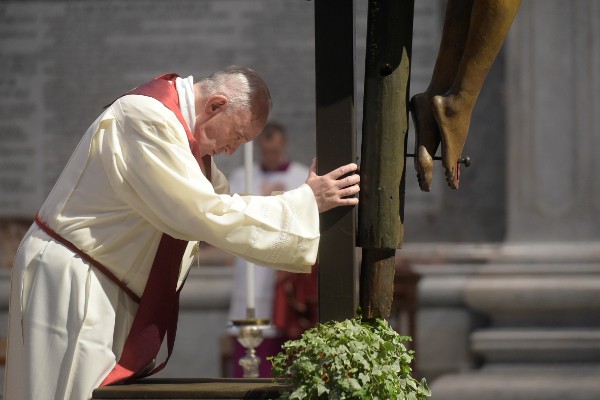The coronavirus pandemic has brought about a watershed moment in human history, the Papal Preacher said today, when the world has an opportunity to embrace solidarity and turn its back on war and inequality.
Preaching beneath a wooden crucifix from the Church of San Marcello on the Corso, believed to have miraculously delivered Rome from a plague in 1522, that was still veiled ahead of its adoration later in the service, Fr Raniero Cantalamessa told Pope Francis and Catholics watching the service over the internet that this was the moment to realise Isaiah’s prophecy of world peace.
Speaking as the global death toll from the coronavirus exceeded 100,000, Fr Cantalamessa, a Franciscan Capuchin, said the world had never been as united as it was in the face of the pandemic.
“When, in the memory of humanity, have the people of all nations ever felt themselves so united, so equal, so less in conflict than at this moment of pain? Never so much as now have we experienced the truth of the words of one of our great poets: ‘Peace, you peoples! Too deep is the mystery of the prostrate earth.’
“We have forgotten about building walls. The virus knows no borders. In an instant it has broken down all the barriers and distinctions of race, nation, religion, wealth, and power. We should not revert to that prior time when this moment has passed,” he said.
To do so would dishonour the legacies of the health workers who had risked their lives to tend to people during the crisis, he added.
“The pandemic of coronavirus has abruptly roused us from the greatest danger individuals and humanity have always been susceptible to: the delusion of omnipotence. It took merely the smallest and most formless element of nature, a virus, to remind us that we are mortal, that military power and technology are not sufficient to save us,” he said.
“Let us say ‘Enough!’ to the tragic race toward arms. Say it with all your might, you young people, because it is above all your destiny that is at stake. Let us devote the unlimited resources committed to weapons to the goals that we now realize are most necessary and urgent: health, hygiene, food, the fight against poverty, stewardship of creation. Let us leave to the next generation a world poorer in goods and money, if need be, but richer in its humanity.”
The Good Friday liturgy was overshadowed by the coronavirus pandemic: the service took place inside an empty basilica, and was shorn of most of its customs. Only Pope Francis venerated the crucifix and received Communion.
A special prayer was added to the traditional intercessions, for the sick, for those who had died, and for those who tended to victims of the virus.
Fr Cantalamessa, in a homily that cited the Italian poet Giovanni Pascoli, Sts Augustine and Thomas Aquinas, addressed head on the problem of evil and suffering. Counselling Chritians to cry out to God at this moment, he strongly criticised any suggestion that the virus was a punishment from God. Rather, he said, God suffered with us, like a mother with her child.
“God is our ally, not the ally of the virus!” He said. “If these scourges were punishments of God, it would not be explained why they strike equally good and bad, and why the poor usually bring the worst consequences of them. Are they more sinners than others? No! The one who cried one day for Lazarus' death cries today for the scourge that has fallen on humanity. Yes, God ‘suffers’, like every father and every mother.
When we will find out this one day, we will be ashamed of all the accusations we made against him in life. God participates in our pain to overcome it.”
God could bring forth good from evils like the pandemic, he said, adding that we see this in the selfless sacrifice of those who care for the sick.
Speaking at the heart of an unprecedented celebration of the Easter Triduum, both in Rome and around the world, Fr Cantalamessa anticipated Easter, and the end of the pandemic.
“We too, after these days that we hope will be short, shall rise and come out of the tombs of our homes. Not however to return to the former life like Lazarus, but to a new life, like Jesus. A more fraternal, more human, more Christian life!



 Loading ...
Loading ...